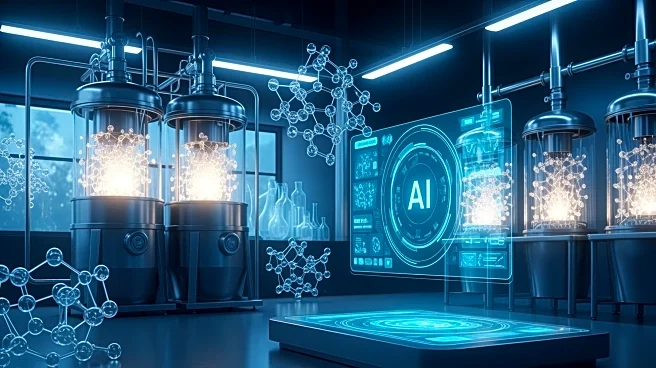What's Happening?
The plant-based cheese industry is undergoing significant transformation through the integration of artificial intelligence (AI) and fermentation techniques. These advancements aim to overcome the challenges
of replicating the taste, texture, and nutritional value of traditional dairy cheeses. While plant-based milk alternatives have progressed to more advanced stages of development, semi-hard cheese analogues lag behind, primarily due to issues with plant protein limitations affecting flavor and texture. Fermentation is being explored as a natural method to enhance flavor, texture, and shelf-life, while AI is used to screen and identify suitable microbes that can improve these attributes. This approach could potentially elevate plant-based cheeses to match the quality of dairy products.
Why It's Important?
The development of plant-based cheese alternatives is crucial for meeting the growing consumer demand for sustainable and health-conscious food options. By leveraging AI and fermentation, the industry can create products that not only appeal to vegan and lactose-intolerant consumers but also to those seeking environmentally friendly choices. This innovation could lead to a significant shift in the dairy industry, reducing reliance on animal-based products and promoting sustainability. Companies that successfully implement these technologies stand to gain a competitive edge in the expanding plant-based market, while consumers benefit from more diverse and high-quality food options.
What's Next?
The next steps involve further refining the AI-assisted screening process to identify the most effective microbial cultures for plant-based cheese production. The Delicious project, a collaboration of universities, research centers, and industry partners, is working on automating this process to facilitate mass adoption. If successful, this could lead to a new generation of plant-based cheeses that closely mimic the sensory and nutritional properties of traditional dairy products. The industry will likely see increased investment in research and development as companies strive to capitalize on these technological advancements.
Beyond the Headlines
The integration of AI and fermentation in food production raises ethical and regulatory considerations, particularly concerning the use of genetically modified organisms and the transparency of ingredient sourcing. As these technologies advance, there will be a need for clear labeling and consumer education to ensure informed choices. Additionally, the shift towards plant-based alternatives could have broader implications for agricultural practices and the global food supply chain, potentially reducing the environmental impact of food production.









